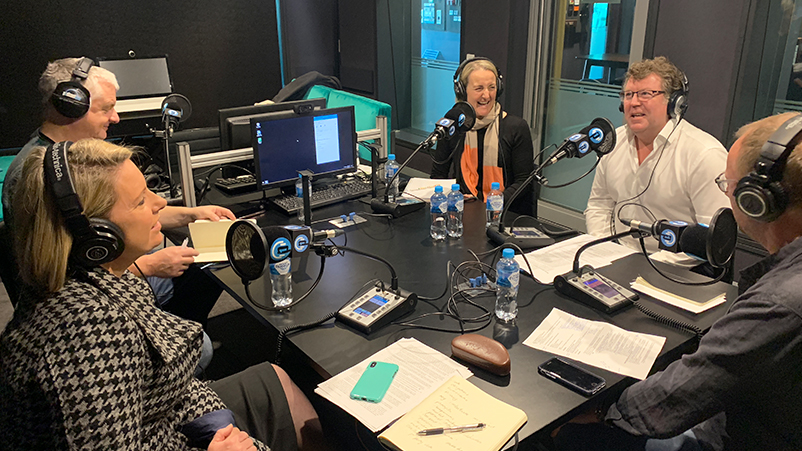ACCC's pro-privacy push on 'marketing surveillance' could see 40% of online users vanish from tracking and targeting

L-R: Brand Traction's Jon Bradshaw; Nine's Clare Gill; Mi3's Paul McIntyre; Southern Cross Austereo's Grant Blackley and News Corp's GK Schubert debate the ACCC's mammoth Digital Platforms Inquiry final report.
A clampdown on user location and ad tracking, restrictions to third-party data sharing and a game-changing shift to a default "Opt Out" consent rule around personal information in a new Federal Privacy Act are all material challenges to the marketing, advertising and technology supply chain carried in a 600-plus page report from the ACCC. The young and old need to get across this one.
Southern Cross Austereo CEO Grant Blackley joins Mutiny's Henry Innis, Nine's Clare Gill, News Corp's GK Schubert and Brand Traction's Jon Bradshaw for an enlightening debate on the ACCC's final Digital Platforms report to the Federal government.
Media owners welcome concrete plans to make digital giants deal with them on fair terms, spying a fairer cut of revenue from the platforms that monetise their content.
But concern is growing that in levelling the playing field around data privacy in an overhaul of the Privacy Act, the government inadvertently hands greater power to the platform giants in a repeat of the early impact from the EU's General Data Protection Regulation (GDPR) last year.
Meanwhile marketers should prepare for deep impact on their data practices, and the media supply chain can expect a lot more people to be poking around their business models to find out exactly where money is changing hands.

Nine's head of regulatory affairs, Clare Gill
No more take it or leave it
Clare Gill, head of regulatory affairs at Nine, is most pleased about ACCC recommendation number seven, which calls for rules to be drawn up to ‘address the imbalance in the bargaining relationship between leading digital platforms and news media businesses’. Gill thinks that means no more take it or leave it.
“The difference between this report and the preliminary report is the recognition of the imbalance in bargaining power between media businesses and the platforms,” says Gill. “That’s key, because it sets the foundation for the recommendations in relation to a regulatory framework to be able to negotiate fairly with the platforms.”
Gill thinks that and other recommendations will mean fairer terms on revenue sharing, and how media businesses can access the platforms. “So, we’re very pleased.”

News Corp's head of policy and government affairs, GK Schubert
Risk of entrenching power?
The flip side for media owners is being forced to comply with catch-all privacy regulation that, rather than create a level playing field, entrenches power with those the regulators are trying to rein-in. GK Schubert, News Corp head of government affairs and policy, suggests that’s a risk, and points to the application of GDPR in Europe by way of example.
“Actually it was the traditional players that got harmed on the way through; they wear a double burden of compliance,” she says. “What you don’t want is to be crimping the businesses that are identified as being harmed through the activities of the platforms within the report.”
"A lot of businesses have invested a hell of a lot in collecting this data behind the scenes - on individuals for shopper analytics and things like that - which are going to get absolutely hit by this kind of update to legislation."

Southern Cross Austereo CEO, Grant Blackley
Southern Cross Austereo chief executive, Grant Blackley, agrees changes to privacy laws and their application must be carefully considered.
“What’s being created here is a two-class society, because the digital giants are ready to actually work with these recommendations. They’ll fight them to a degree, but fundamentally they have a huge tech stack and the capacity to actually work with the industry, work with government to actually change this,” says Blackley. “The rest of us have done enormous amount of work. It comes back to what can we afford on the bottom line.”
Blackley thinks the optimal outcome is if industry “as a whole operates as one with a very firm foundation that we can then nurture together.
“I think that’s a good thing, rather than everyone being at a different place, with varying levels of maturity and different data - which is not only confusing and expensive, but actually plays into the hands of the digital giants.”
Henry Innis, managing partner at Mutiny, agrees there is a risk of entrenchment with a catch-all consent solution. Facebook for example, has a natural advantage, given it has embedded itself in the social lives of most Australians, according to its user numbers.
“If Facebook suddenly says, ‘We want to capture your personal information for this, this and this reason,’ I think people are kind of hooked, so they’re not going to switch off Facebook for that reason. So that’s a bit of a double-edge sword - you kind of do entrench these big platforms [that have become] essential to everyday consumer lives.”

Mutiny managing partner, Henry Innis
Marketers: Prepare for impact
Innis suggests marketers need to get across data and any revisions to the Privacy Act sooner rather than later. He also says the result of government action will “place much greater reliance on brands building up first party data sets … rather than renting it off third parties, which has been the default position for marketers in Australia for some time”.
Meanwhile, if the government backs the ACCC’s recommendation for a default ‘off’ setting for consent, and personal information is redefined to include IP addresses and device IDs, it could reduce the addressable audience for targeted ads by as much as 40 per cent, according to some estimates.
“Or higher, much higher,” says Innis. “There are all sorts of challenges around consent and what constitutes personal information. It will certainly impact the entire martech industry quite significantly. A lot of businesses have invested a hell of a lot in collecting this data behind the scenes - on individuals for shopper analytics and things like that - which are going to get absolutely hit by this kind of update to legislation,” he suggests. “If it happens.”
“I think everyone should be very cognisant of the powers that the ACCC has [to raise] both civil and criminal [charges]."
Media supply chain: probe incoming
The ACCC’s recommendation of an inquiry around money flows and opaque practices within the media supply chain – including adtech vendors, agency brands and holding groups – might make a few people nervous.
But SCA’s Blackley suggests it could provide an opportunity to rebuild trust – if the industry is willing to collectively address transparency. He thinks an investigation that carries a significant level of threat may concentrate minds.
“I think everyone should be very cognisant of the powers that the ACCC has,” to raise “both civil and criminal” charges, says Blackley. He believes the “threat that this is being judged by a very strong authorising independent body of government” will encourage people “to try and do the right thing”.
Blackley says while it is “incumbent on the ACCC” to try and shine a light on opaque practices, “it is also incumbent on the client and marketing community to demand answers”.
Go much deeper in the Mi3 podcast.
